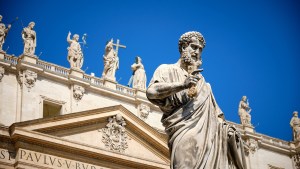In the attic of St. Peter’s Basilica in Rome, almost 130 feet above the ground, visitors will soon be able to immerse themselves in a fascinating exhibition. It will trace the history and meaning of the basilica built over the tomb of the Apostle Peter. This prodigious journey, in the shadow of the dome designed by Michelangelo, has been made possible thanks to the work of a small French company allied with the American giant Microsoft.
Founded in 2013, Iconem specializes in the 3D digitization of exceptional sites. From the city of Palmyra in Syria to the pyramids of Egypt and a temple of Angkor Wat in Cambodia, the French start-up has flown its drones in Africa, Asia, Europe, and America to preserve the memory of remarkable heritage sites and share it.
“We’ve done a lot of work in conflict zones, so in Afghanistan, Syria, Iraq, and Libya, where heritage is under threat,” Yves Ubelmann, president and founder of Iconem, tells Aleteia.
But if you look at the map of projects carried out by this company of around 10 employees, Christian heritage features prominently among the projects undertaken.
In France, for example, the digital reproduction of Mont-Saint-Michel was created by Iconem, as were copies of Reims cathedral, the Sacré-Coeur basilica, and Saint-Germain-des-Prés church in Paris.
In Armenia, several monasteries, such as the Monastery of Gherart, near Yerevan, have been digitally safeguarded.
The millions of data points they have collected enable scientists to study the sites, better understand their history, and better safeguard them. The digitization of the “troglodyte” (made of caves carved into a stone hill) abbey of Saint-Roman, in France, for example, has supported work to stabilize and increase appreciation of the site.
“We have scanned many Christian sites in Europe, the Middle East, and the United States. We’re becoming aware of the diversity of Christian architecture,” says Ubelmann. “In Armenia, for example, there are fortified monasteries that served to protect the entire community and its treasures. The monastery served as a place of worship, a defensive castle, and also as a bank.”
400,000 photos for St. Peter’s
For St. Peter’s Basilica in Rome, 400,000 photos were taken to capture every nook and cranny of the edifice. Drones were flown inside and outside of the basilica to collect high-resolution images. The experts also used lasers to perfectly reproduce the monument in three dimensions.
“It’s one of the most complex monuments we’ve ever scanned. Inside the basilica itself, there’s a labyrinthine network of rooms hidden from visitors, corridors, and staircases,” explains Ubelmann, who is an architect by training.
The 3D representation helps visitors understand how the edifice has been built — and rebuilt — over the centuries.
“It’s a real lesson to discover the creativity of architects who have responded to questions that are both spiritual and pragmatic,” emphasizes Ubelmann.
To reflect the ingenuity of the builders of the time, Iconem helped design the immersive exhibition that will soon open to the general public under the roof of St. Peter’s Basilica.
The shock of the Notre-Dame fire
The digitization of this exceptional heritage has a conservation role that is becoming increasingly obvious to the start-up’s CEO.
“I had visited the forest [hidden wooden roof framework, editor’s note] of Notre-Dame de Paris a few months before the fire, with the aim of digitizing it,” he says. But more urgent digitization operations had postponed the Paris project.
“It was a shock. I realized that priorities aren’t always what you think, and that you have to scan quickly when you have access to a place,” he says.



